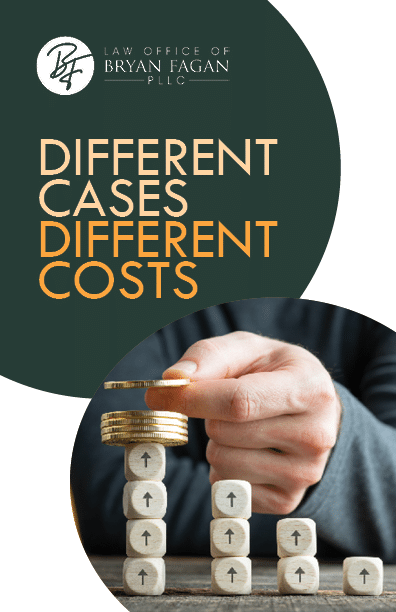
The average cost of a divorce in Texas: What you should expect is a topic that weighs heavily on people as they begin the legal process of ending a marriage. Divorce is both an emotional and financial challenge and the cost is often one of the biggest concerns. The expenses vary widely, influenced by the complexity of the case, whether children are involved and how spouses choose to resolve disputes. Understanding the factors that shape these costs helps you prepare both financially and emotionally. When you know what drives the price, you can make better choices and avoid unnecessary surprises.
Why Divorce Expenses Are Different for Every Couple
No two divorces look alike, which means costs are never identical. Several variables come into play, starting with whether the case is contested or uncontested. If both spouses agree on all major issues, costs stay low. If disputes exist over property, custody or financial support, the process becomes more time-consuming and expensive.
The complexity of the marriage itself also affects the price. Couples with significant assets, businesses or multiple properties usually face higher expenses. When disagreements arise, attorneys spend more hours preparing documents, negotiating and appearing in court. Every hour of additional work adds to the bill which is why cooperation can dramatically reduce costs.
Court Filing Fees and Administrative Costs
The first official cost you face when filing for divorce in Texas is the court filing fee. In most counties these fees range from $250 to $350. This fee is necessary to open the case and begin the court process. Beyond the initial filing, there may be fees for additional motions, certified copies or citations.
Another related expense is service of process. Unless your spouse waives service, you must pay for delivery of the petition by a sheriff, constable or private process server. These costs are relatively small compared to attorney fees but they add to the total and are unavoidable. Preparing for them early keeps your budget accurate.
Attorney Fees and Retainer Agreements
The largest portion of the average cost of a divorce in Texas and what you should expect is attorney fees. Most family law attorneys charge hourly rates that range from $200 to $500. Attorneys also require an upfront retainer, which may start at $2,500 and increase depending on the case.
Uncontested divorces tend to be far less expensive because they require fewer hours of attorney time. Contested divorces that involve multiple hearings, discovery or trial preparation can cause costs to climb quickly. Every email, phone call or court filing adds to the bill. This is why attorneys often stress the value of negotiation and compromise.
| Expense Type | Explanation |
| Hourly Rates | Family law attorneys in Texas typically charge between $200 and $500 per hour. |
| Retainers | Most attorneys require an upfront payment, often starting at $2,500 or more. |
| Uncontested Divorce | Requires fewer attorney hours, so overall legal fees remain lower. |
| Contested Divorce | Involves more hearings, motions, and preparation, which significantly increases total attorney costs. |

Mediation and Alternative Dispute Resolution
Mediation is a common step in Texas divorces and can help reduce costs compared to a full trial. During mediation, a neutral third party helps both spouses reach agreements on disputed issues. Mediators charge fees that are typically shared between spouses. In Texas fees for mediation range from several hundred to several thousand dollars depending on the length of the session and the mediator’s expertise.
While mediation adds an expense, it often saves money in the long run. Trials are much more expensive and stressful. Settling disputes in mediation reduces court time and attorney hours. This makes mediation an effective investment for many couples.
Custody and Child Support Considerations
When children are involved, costs usually increase. Child custody requires careful planning and sometimes outside evaluations. Attorneys must draft detailed parenting plans that outline visitation schedules, decision-making responsibilities and child support calculations.
If parents cannot agree, the court may appoint custody evaluators or psychologists. These experts charge fees for their time and reports. While this increases the total cost, it ensures that the child’s best interests remain at the center of the case. Parents should prepare for higher expenses when custody is contested.
Property Division and Financial Complexity
Texas follows community property rules, meaning that most property acquired during marriage belongs to both spouses. Dividing this property can be simple or complex, depending on the assets. Couples with limited property may resolve issues quickly. Couples with businesses, investments or multiple properties may need appraisers, accountants or financial experts to ensure fair division.
Hiring experts adds to the overall cost but it prevents one spouse from being shortchanged. Accurate valuations are critical when dividing retirement accounts, real estate or business interests. While property division raises costs, it also provides clarity and fairness which is essential for long-term stability.
Spousal Support Issues
In some cases, one spouse may request spousal maintenance, often called alimony. Determining eligibility and calculating payments requires detailed financial analysis. Attorneys must review income, expenses and earning potential, which adds hours to the case.
Spousal support may also be heavily contested, leading to additional hearings. This raises attorney fees and prolongs the process. While spousal support itself is not a direct court fee, the legal work surrounding it contributes to the overall cost of divorce.

Costs of Going to Trial
When spouses cannot reach agreements the case may proceed to trial. Trial is the most expensive stage of divorce because it requires extensive preparation, multiple days in court and significant attorney time. Trial preparation may include witness interviews, expert testimony and detailed exhibits.
The longer the trial, the higher the cost. Trials can also increase emotional stress and extend the case timeline. Most couples attempt to settle before reaching this stage but some disputes require judicial resolution. Knowing that trial costs are steep often motivates parties to seek compromise earlier.
Average Cost Ranges in Texas
Although exact costs vary, averages provide a useful guideline. Uncontested divorces with little conflict can cost between $3,000 and $5,000. Contested divorces involving disputes over custody or property range from $15,000 to $30,000. High-asset divorces or cases that go to trial can exceed $50,000.
These numbers highlight the wide gap between simple and complex cases. While uncontested divorces are much less expensive, contested cases can quickly drain resources. Knowing the potential ranges helps families prepare financially for the road ahead.
Reducing the Financial Burden
Even though divorce can be costly, there are ways to reduce expenses. Staying organized and providing complete records to your attorney saves time and reduces billing hours. Choosing mediation instead of trial can cut costs significantly. Pursuing an uncontested divorce, when possible, keeps expenses lower.
Communication with your spouse also helps. The more you resolve outside of court, the less you pay in attorney and court fees. While not every conflict can be avoided, cooperation reduces both cost and stress. Taking these steps allows couples to manage expenses more effectively.
Emotional Costs and Their Financial Impact
The financial side of divorce is only one piece of the puzzle. Emotional strain often extends the process and increases costs. High conflict cases take longer, require more attorney involvement, and often involve additional professionals. Stress and anger can lead to poor decision-making which may prolong negotiations.
Protecting your emotional health can indirectly lower financial costs. Seeking counseling, maintaining support networks and focusing on long-term goals helps reduce conflict. When emotions are managed well, the legal process tends to move faster and cost less.
The Importance of Legal Advice
While it is natural to focus on cost, quality legal guidance is crucial. Attorneys ensure that agreements are fair, enforceable and in your best interest. Mistakes in property division or custody agreements can cost far more in the future than attorney fees in the present.
Experienced attorneys also help you meet deadlines and avoid errors that could delay your case. Investing in professional representation provides peace of mind and long-term security. Although legal fees form a large part of the expense, they are often necessary for a fair outcome.
Long-Term Financial Planning
The average cost of a divorce in Texas and what you should expect includes both short-term and long-term expenses. Immediate costs involve attorney fees, filing fees and expert costs. Long-term costs include spousal support, child support and divided property. These obligations shape your financial future long after the divorce is final.
Working with financial advisors during divorce can help you prepare for the future. Planning for taxes, support payments and new budgets ensures stability. By looking beyond the immediate case you reduce surprises and protect your financial health.

Final Thoughts
The average cost of a divorce and what you should expect is not simply a dollar figure to glance at and forget. It represents a complex mix of legal procedures, personal decisions and the specific circumstances of each family. The cost of divorce is shaped by the complexity of the issues involved, the willingness of the parties to compromise and the resources required to resolve disputes.
Uncontested divorces are generally straightforward and much more affordable because both spouses work together to reach agreements. In contrast, contested divorces involving disputes over child custody, high-value property or lengthy trials can become extremely costly and time-consuming. These differences illustrate why it is impossible to assign a single price tag to divorce without carefully examining the details of each case.
Preparation is important
Understanding the potential range of costs allows you to prepare more effectively both financially and emotionally. Divorce is never easy but spouses who plan ahead can reduce stress and avoid unnecessary financial strain. Choosing to cooperate where possible, staying organized with records and considering mediation or other alternatives to trial are practical steps that often lower expenses significantly.
At the same time, it is important not to cut corners when it comes to legal advice. Skilled attorneys ensure that your rights are fully protected, agreements are enforceable and long-term consequences are carefully considered. Divorce is both a financial and personal journey, and the choices you make will influence your stability well into the future. By knowing what to expect and preparing accordingly you give yourself the best chance of moving forward with clarity, confidence and a foundation strong enough to build a secure new chapter in life.
Other Related Articles:
- The Complete Guide to the Cost of Divorce in Texas
- How Cost Of Divorce With Child In Texas Could Affect Your Future
- Is Average Cost Of Divorce In Texas the Best Option for You?
- How to Handle Cost Of Divorce In Texas the Right Way
- Guide to Reducing the Cost of Divorce
- What Is Included in the Average Cost of Divorce Mediation in Texas?
- Comparing the Cost of Divorce in Texas vs. Other States
- How Much Does an Uncontested Divorce Cost in Texas? Step-by-Step Guide
- Texas Divorce Costs Explained: Fees, Attorney Rates & Ways to Save
- Why Divorce Costs in Texas Are Rising Faster Than Expected





